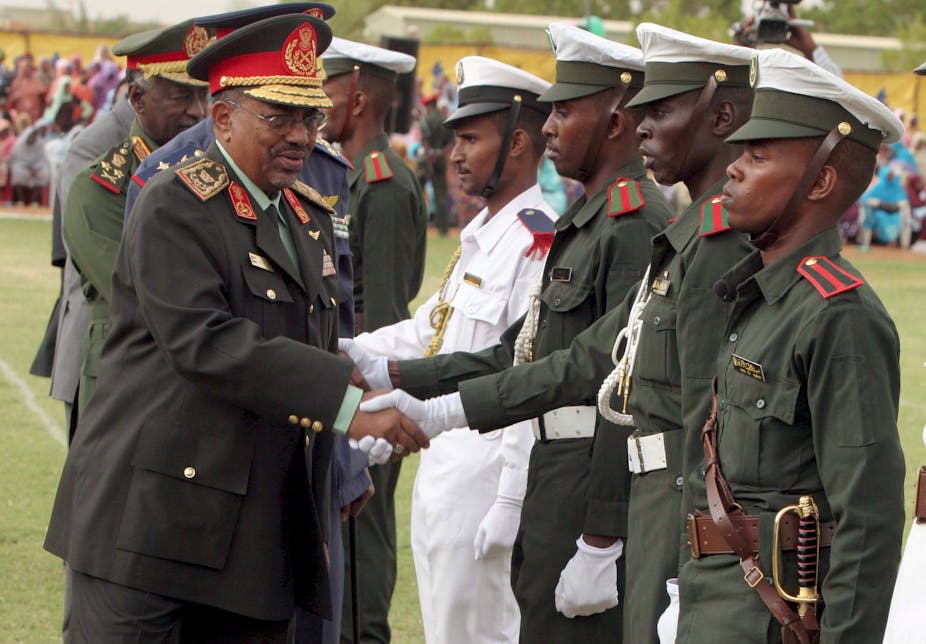
President Omar al-Bashir’s declaration of a year-long state of emergency in Sudan indicates that he’s opted, for now, to take the route of greater repression to quell popular protests. He has also dissolved state governments and appointed military or intelligence officers as new governors in the country’s 18 states.
But Sudanese citizens are not backing down. Protests that started in the country’s major cities last December are continuing. They are led by the association of Sudan’s professionals and youth who are calling for more economic opportunities and political freedoms after 30 years under al-Bashir.
Al-Bashir’s actions should be assessed from the perspective of his political base. His long tenure can be attributed to his cultivation of three main pillars of support: the military, the ruling National Congress Party, and an embrace of political Islam.
One of the hallmarks of the political Islam project launched after the 1989 coup was the introduction of Islamic law. Security forces were beefed up and Islamic law was applied strictly to the chagrin of millions of South Sudanese and elsewhere.
But now al-Bashir seems to have turned his back on two of those three pillars. He’s consolidated military support, but neglected his other support bases. This has led to unhappiness in the ruling party and among its members who identify as political Islamists.
Consolidation and tension
The military is a natural base of support for the former brigadier general who led the 1989 military coup that brought him to power. So it makes sense that he’s trying to consolidate this support in several ways – for instance, by appointing Defence Minister Awad Ahmed Ib Auf as his first vice president (he will retain his defence role).
The president also maintains support from the intelligence services, dominated by his own ethnic group, the Ja’aliyin. Some observers feel these appointments the state and government appointments will set the stage for al-Bashir’s reelection bid in 2020.
Others have suggested that he may opt to resign and hand over power to the army. This approach would provide him with strong guarantees against prosecution when he leaves office.
But while he’s focused on consolidating support within the military, al-Bashir has effectively abandoned his ruling National Congress Party and the hardline Islamists in it. This has set off a factional war within the ruling party.
The National Islamic Front, which later became the National Congress Party, was a small party in the 1960s. But it grew in the post-independence era by focusing on student movements, using religion to appeal to the population, and garnering support from international Islamic movements.
Today it dominates parliament with 323 out of a total of 426 seats. But it isn’t immune to power struggles and factionalism. Some of its influential senior members are opposed to the military’s increasing encroachment into government affairs, and worry that political Islamists are being sidelined by the al-Bashir regime.
Speculation is now rife that al-Bashir may form his own political party or that displeased members may abandon the ruling party and form a new political party. Since the National Congress Party relies on the state’s power and resources, some believe its political base will rapidly erode if al-Bashir abandons it.
At the same time, the influence of political Islam is waning in Sudan. Islam remains the dominant religion – but citizens are hitting back at the politicisation of the faith. Sudan has historically embraced Sufism, which is characterised by tolerance and accommodation.
The protesters see political Islam, as exemplified by the ruling party, as divisive and exclusionary.
Non-Islamist forces
Notably, the protests in Sudan are led by non-Islamist forces. Moreover, they are nonviolent and well organised with a clearly articulated political agenda. Maintaining the peaceful nature of the protests will be key to sustaining this support. This will be more difficult if the security forces increase their use of force. Adding to the complexity is that disgruntled members of the ruling party may join the protests, which may trigger violent confrontations.
The intricate internal dynamics that are reshaping the pillars of power in Sudan make it difficult to predict how the current crisis will unfold. The peaceful protests calling for a transitional, technocratic government leading to genuine elections is an attempt to provide an alternative pathway to stability and peace in Sudan. Doing so would be a break from Sudan’s historical legacy of power changing only through uprisings and military coups.![]()
Luka Kuol, Professor of Practice for Security Studies , Africa Center for Strategic Studies
This article is republished from The Conversation under a Creative Commons license.

